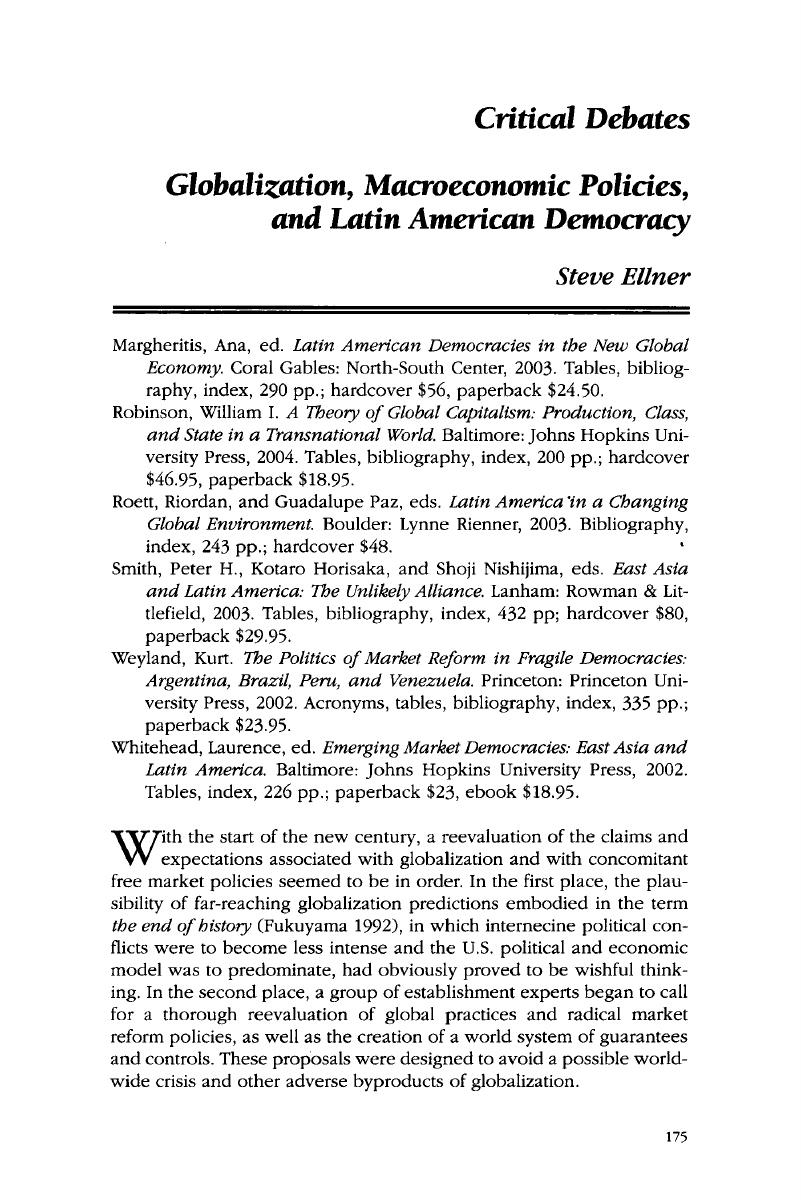No CrossRef data available.
Article contents
Globalization, Macroeconomic Policies, and Latin American Democracy
Published online by Cambridge University Press: 02 January 2018
Abstract
An abstract is not available for this content so a preview has been provided. Please use the Get access link above for information on how to access this content.

- Type
- Critical Debates
- Information
- Copyright
- Copyright © University of Miami 2006
References
Arrighi, Giovanni, and Beverly, J. Silver.
1999. Hegemonic Transitions: past and Present. Political Power and Social Theory
13: 239–75.Google Scholar
Bergquist, Charles W.
1986. Labor in Latin America: Comparative Essays on Chile, Argentina, Venezuela, and Colombia. Stanford: Stanford University Press.Google Scholar
Bernstein, Richard, and Ross, H. Munro.
1997. China I: the Coming Conflict with America. Foreign Affairs
76, 2 (March–April): 18–32.Google Scholar
Burbach, Roger.
2001. Globalization and Postmodern Politics: From Zapatistas to High-Tech Robber Barons. London: Pluto Press.Google Scholar
Burbach, Roger, and William, I. Robinson.
1999. The Fin de Siècle Debate: Globalization as Epochal Shift. Science and Society
63, 1 (Spring): 10–38.Google Scholar
Collier, Ruth Berins, and David, Collier.
1991. Shaping the Political Arena: Critical Junctures, the Labor Movement, and Regime Dynamics in Latin America. Princeton: Princeton University Press.Google Scholar
Ellner, Steve.
1999. The Heyday of Radical Populism in Venezuela and Its Aftermath. In Populism in Latin America, ed. Michael, Conniff. Tuscaloosa: University of Alabama Press. 117–37.Google Scholar
Ellner, Steve.
2003. The Contrasting Variants of the Populism of Hugo Chávez and Alberto Fujimori. Journal of Latin American Studies
35, 1 (February): 139–62.Google Scholar
Gowan, Peter.
1999. The Global Gamble: Washington's Faustian Bid for World Dominance. London: Verso.Google Scholar
Harrison, Lawrence E.
1985. Underdevelopment Is a State of Mind: The Latin American Case. Cambridge/Lanham: Center for International Affairs, Harvard University/University Press of America.Google Scholar
Harrison, Lawrence, and Samuel, Huntington.
2000. Culture Matters: How Values Shape Human Progress. New York: Basic Books.Google Scholar
Huntington, Samuel P.
1996. The Clash of Civilizations and the Remaking of World Order. New York: Simon & Schuster.Google Scholar
Karl, Terry Lynn.
1997. The Paradox of Plenty: Oil, Booms, and Petro-States. Berkeley: University of California Press.Google Scholar
O'Donnell, Guillermo.
1994. Delegative Democracy. Journal of Democracy
5, 1 (January): 55–69.Google Scholar
Oxhorn, Phillip D., and Graziela, Ducatenzeiler, eds. 1998. What Kind of Demcoracy? What Kind of Market? Latin America in the Age of Neoliberalism. University Park: Pennsylvania State University Press.Google Scholar
Petras, James, and Henry, Veltmeyer.
2001. Globalization Unmasked: Imperialism in the 21st Century. London: Zed Books.Google Scholar
Weyland, Kurt.
1998. The Politics of Corruption in Latin America. Journal of Democracy
9, 2 (April): 108–21.Google Scholar
Weyland, Kurt.
2004a. Assessing Latin American Neoliberalism: Introduction to a Debate. Latin American Research Review
39, 3: 143–49.Google Scholar
Weyland, Kurt.
2004b. Neoliberalism and Democracy in Latin America: a Mixed Record. Latin American Politics and Society
46, 1 (Spring): 135–57.CrossRefGoogle Scholar




